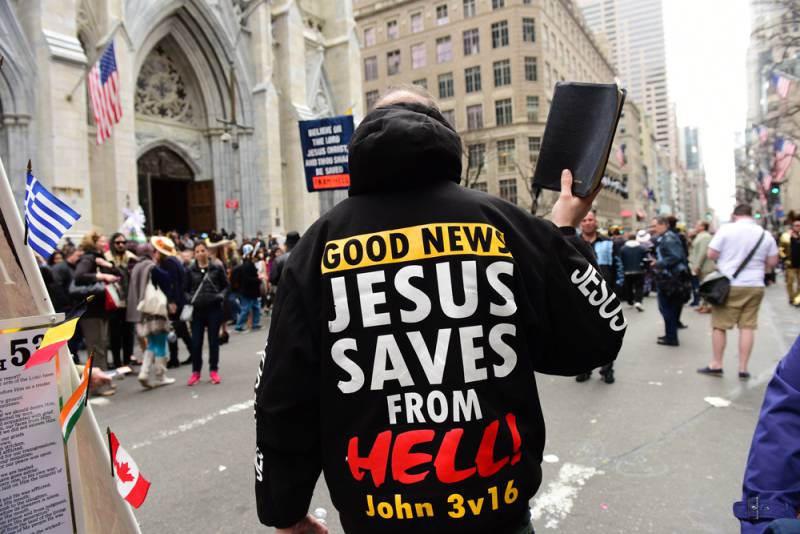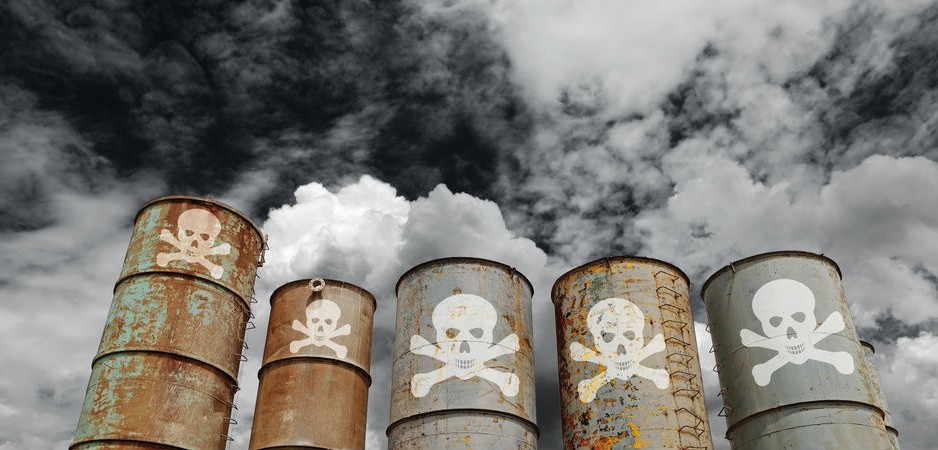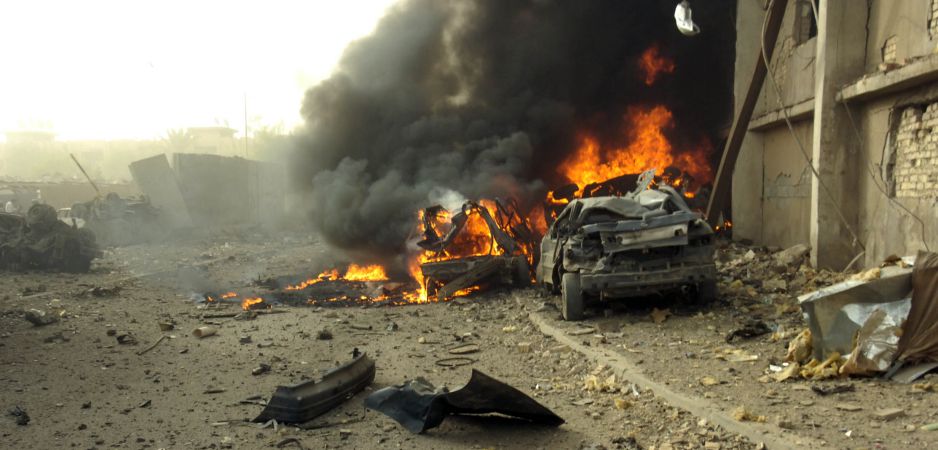Fundamentalist Christianity is a danger to both the global image and the future development of America.
In the aftermath of the Paris attacks in January, the world stage has been rife with discussion about the dangers of Islamist extremism. That fateful word, “extremism,” has always carried a charge, but in the long shadow of 9/11 it has become especially sinister. In many cases, the response to perceived extremism is itself quite radical, often involving violent racism against those with alleged connections to extremist groups.
For many, since 2001, the word “extremism” has largely become associated with “terrorism,” and with radical Islam in particular. Due to the tragic events of September 11, 2001, and President George W. Bush’s unforgivable response to them, many Americans equate the words “extremist” and “Muslim.” The unceasing atrocities committed on all sides in the Middle East have fortified this architecture of hatred, strengthening bigoted mindsets with each new act of violence. America has proven itself to be fertile ground for racial hatred.
This is not a new phenomenon, and it has had a long history in the United States. During the fraught years of the Cold War, communism took the role of public enemy number one, instilling fear and inciting betrayal among the populace. Many were investigated and imprisoned during the McCarthy era due to the false assumptions that anyone with perceived ties to communism was a card-carrying communist himself, and therefore threatened the freedom of capitalist America.
Other extremist groups have made appearances in US history—the Black Panthers of the Civil Rights Movement, the constant simmer of Ku Klux Klan activity and, of course, the die-hard Protestant extremism that allowed the pilgrims to massacre millions of Native Americans in pursuit of their paradise of equality.
Smaller radical movements, such as the ill-fated Jonestown and the crumbling Galt’s Gulch, germinated in the US and matured abroad, in Guyana and Chile respectively. Not to mention the uniquely American tradition of school shootings by angry young men.
Jesus Camp
For these reasons, it’s not surprising that the US has been gestating its own form of religious extremism for the past century. This movement follows in the tracks of countless extremist groups before it: radical interpretation of a holy text, reactionary responses to perceived threats and pervasive indoctrination of children. The movement is fundamentalist Christianity, and it is a danger to both the global image and the future development of the United States of America. Where the members of radical Islamist groups may threaten lives, America’s own form of radicalism threatens progress.
For proof that radical Christianity shares its shape with that of radical Islam, one needs look no further than Jesus Camp, a terrifying, eye-opening window into this world. The documentary dives into the strange universe of “Kids on Fire”—a camp for evangelical children in North Dakota. Among the film’s most disturbing scenes are sequences of children weeping and speaking in tongues. The woman in that clip is Becky Fischer, the pastor and coordinator of the camp. In a fit of zealous joy, Fischer exclaims:
“Where should we be putting our focus? I’ll tell you where our enemies are putting it. They’re putting it on the kids … It’s no wonder, with that kind of intense training … that those people are ready to kill themselves for the cause of Islam. I want to see young people who are as committed to the cause of Jesus Christ as the young people are to the cause of Islam. I want to see them as radically laying down their lives for the Gospel as they are over in Pakistan, in Israel, in Palestine, in all those different places, because we have—excuse me, but we have the truth!”
Here, proud and unmasked, stands an admission of extremism. If Pastor Fischer had her way, American children would be murdering innocents in the name of their prophet. Thankfully, she is on the far fringe of extremist Christians. Her crusade is not a particularly influential one, and the popularity of the documentary made it even less so. The dangers of Christian extremism reach far beyond one woman’s laughable attempt to weaponize children. To understand the real threats posed by this group, one must understand its history.
The Literal Truth
Fundamental Christianity, along with its central tenet of biblical literalism, appeared relatively recently on the world stage. According to Reza Aslan, renowned author and scholar of religion, it arose from the “backlash to Christian liberalism and the Scientific Revolution at the end of the 19th century by a group of American Protestants who began a movement that was launched by a series of tracts” titled The Fundamentals. Before this group rebelled against what they saw as the moral decay of their church and country, Christians read the Bible as a guide, an ally to help navigate the difficult terrain of life. It is only since the publication of The Fundamentals that certain details of the New Testament have come to be seen as the literal truth.
This group of Protestants planted the seed for the beliefs of millions of Americans today. It’s impossible to get exact numbers, since fundamentalists haven’t self-identified as such since the 1800s. Biblical literalists march under many different banners, and they believe in as many different versions of the fundamental truth. But if one looks individually at the various facets of Christian fundamentalism, a larger shape begins to emerge—a shape common to all extremist sects.
The original fundamentalists were Evangelical Protestants. Some 82 million people, or 26% of Americans, identify as Evangelical Protestant. But a 2010 Gallup poll shows that four in ten Americans “believe God created humans in their present form about 10,000 years ago.” Almost half the people in the United States are lower-case fundamentalists, assuming the beliefs but not the sect of their forebears.
These beliefs in themselves are perfectly safe, as are any beliefs. It is not adherence to the word of the Bible that makes this group such a danger to America and the world at large. Rather, it is their refusal to accept any reality but that of their holy book that turns their piety malignant.
Though the theory of evolution has been fighting a winning battle since Charles Darwin’s voyage on the Beagle, some of its most vocal opponents are kicking and screaming in the southern United States. Tennessee and Louisiana both allow public schools to teach creationism as part of a science curriculum, while Texas’ “Responsive Ed” charter schools suck up $82 million in tax dollars per year while actively teaching against evolution. These policies took root following the publication of The Fundamentals, beginning in 1925 with the infamous Scopes “monkey trial” and continuing through today.
Rejecting Science
While understanding our origins is a crucial part of anyone’s worldview, denial of evolution is neither the only nor the largest threat posed by fundamentalists. Climate change, the monster that rears new and ever-uglier heads each year, is also firmly denounced. A 2008 Pew Research Center survey showed that only 34% of Caucasian Evangelical Protestants believe climate change is a significant problem, lower than any other demographic surveyed.
This is far more baffling than the anti-evolution bias. Nowhere in the Bible is there any mention of climate change—it simply wasn’t a problem when the Bible was written. So why are so many Protestants unwilling to believe in humanity’s effect on our planet?
One reason is that statistics are misleading. It is, in fact, mainly conservatives who stand to benefit from climate denial. Since the majority of Evangelical Protestants are also Republican, the lines and numbers blur. But there is also an element of reflexive negation involved. Following from the morals of their progenitors, modern fundamentalists are fighting imagined demons tooth and nail.
The best way they can come up with to fend off perceived attacks on their faith is to teach their children that the faith is absolute, that no contradicting evidence can be considered. This is the real threat of America’s extremism, and it is leaking over religious boundaries and into the public consciousness. In 2014, an Ipsos Mori survey found that fully 54% of Americans are “tired of the fuss that is being made over the environment.” Combined with the above numbers on evolution, a picture begins to emerge of consistent and comprehensive rejection of the information provided by science.
Whether climate-deniers and creationists call themselves Protestants, Catholics, atheists or Jains, they exhibit precisely the same symptoms evidenced by the authors of The Fundamentals 100 years ago. Rebellion against scientific knowledge is common throughout history. It’s difficult to accept new truths, especially when they contradict entrenched beliefs. When science says the Earth is 4 billion years old, those whose worldview absolutely depends on a younger Earth will be all the more ready to distrust any other information turned up by the suspect discipline.
Education, then, is the reason radical Christians pose such a threat to the future of the United States. It is also the reason for the similarities between radical Christianity and radical Islam. The aim of all cults is to indoctrinate children. Who better to carry a torch than one who has burned with conviction since they knew how to think?
Fundamental Christianity is no different, and its methods of indoctrination are well-established: home-schooling children to minimize exposure to foreign ideas; fostering guilt and shame for thoughts or actions outside the scope of the dogma; and denouncing everyone outside the sect, thus shutting the child in a closed mental loop with no means of escape.
What we have to fear most from this infectious form of extremism isn’t bombs and terrorist plots. Rather, it’s the failure to educate a generation about the threats bearing down upon them. The irony is palpable: In the one generation where the end times are literally nigh, those who have cried wolf so many times refuse to see the predator prowling the edges of the flock.
This grave error has at its root the same rot that lies at the core of so many of the United States’ problems: the fatal flaw of the closed mind. The world stands to face a calamitous few decades no matter what happens. If America’s fundamentalists do not open their minds to the evidence in front of them, the future will be all the bleaker for it.
The views expressed in this article are the author’s own and do not necessarily reflect Fair Observer’s editorial policy.
Photo Credit: Rachata Sinthopachakul / A. Katz / Shutterstock.com
 We bring you perspectives from around the world. Help us to inform and educate. Your donation is tax-deductible. Join over 400 people to become a donor or you could choose to be a sponsor.
We bring you perspectives from around the world. Help us to inform and educate. Your donation is tax-deductible. Join over 400 people to become a donor or you could choose to be a sponsor.
For more than 10 years, Fair Observer has been free, fair and independent. No billionaire owns us, no advertisers control us. We are a reader-supported nonprofit. Unlike many other publications, we keep our content free for readers regardless of where they live or whether they can afford to pay. We have no paywalls and no ads.
In the post-truth era of fake news, echo chambers and filter bubbles, we publish a plurality of perspectives from around the world. Anyone can publish with us, but everyone goes through a rigorous editorial process. So, you get fact-checked, well-reasoned content instead of noise.
We publish 2,500+ voices from 90+ countries. We also conduct education and training programs
on subjects ranging from digital media and journalism to writing and critical thinking. This
doesn’t come cheap. Servers, editors, trainers and web developers cost
money.
Please consider supporting us on a regular basis as a recurring donor or a
sustaining member.
Support Fair Observer
We rely on your support for our independence, diversity and quality.
Will you support FO’s journalism?
We rely on your support for our independence, diversity and quality.




















